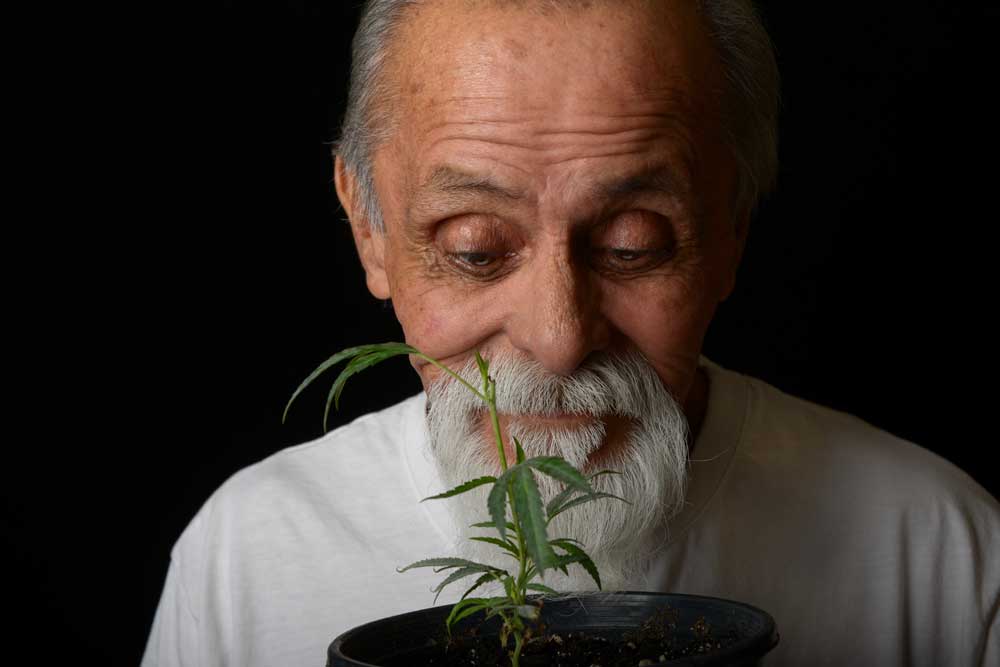Cannabis… For some, just a plant, but for many more it is a life changing, natural medicine. Medical marijuana, like the plants themselves, has steadily grown to prominence in Canada. Over the decades, it’s became an absolute essential for many Canadians’ quality of life. What ways has cannabis shaped our views of natural medicine? How are people using it today to treat their ailments? Let’s put on our stethoscopes and check the pulse of medical marijuana in Canada.

For as long as humans have consumed cannabis, which is a very long time, this plant and its wealth of healing properties has been an important part of many peoples’ lives. Some archaeological evidence has shown cannabis cultivation dating back as far as 5000 years! That’s as old as the pyramids, and about as far back as much of recorded human history. There’s even been some rumblings of cannabis or hemp use among Prehistoric humans (Paleolithic, Neolithic eras of the “Stone Ages”). If these studies prove to be true, that would mean humans have cultivated, produced and potentially consumed cannabis for thousands of years more than was originally thought possible.
As exciting as unlocking the mysteries of our past with this plant are, it’s the advancements in medicine and natural, plant-based remedies that are truly creating a buzz around cannabis. For the past 100 years, Canada and many parts of the world have cultivated hemp & cannabis and created a strong community of medicinal cannabis users. Although this movement was largely an “underground” one due to cannabis’ status as an illicit substance until the groundbreaking case of Terence Parker in 1996, marijuana for medical purposes has had a strong following among a multitude of Canadians. People in this country have grown their own cannabis for many medicinal purposes: to treat their pain or inflammation; for seizures and epilepsy; neurological disorders or mood balancing (depression, anxiety); and a variety of day-to-day afflictions like sleep deprivation, nausea and itchy skin.
When Canadian governments sought to suppress cannabis use, or access to the plant itself, Canadians fought back on the streets, in the doctors’ offices, and in the courts. There was not a lot of proof, in terms of officially published research data, for the medical efficacy of cannabis, but this was largely due to the political atmosphere surrounding this misunderstood plant. Researchers were intrigued by marijuana, especially when confronted with the public’s cry for more data on the positive qualities of the plant. Despite their interest, many researchers’ hands were tied because of the illegal nature of cannabis, so the studies looking at the medical properties of marijuana weren’t even able to get off the ground, let alone running.



Despite the lack of data for cannabis’ medical properties, thousands of people have had their lives changed in a major way because of it. Throughout the years, there have been many people whose serious diseases, injuries or conditions have been positively impacted by cannabis use. Debilitating ailments like epilepsy, dementia, Parkinson’s, MS, depression and even cancer have all been shown to be treatable with medical marijuana, whether it be a reduction in symptoms or a reversal of the condition altogether. Now that cannabis is legalized throughout Canada, both medically and recreationally, the research taps are steadily turning on and the data will begin to flow into the realm of public knowledge. While we wait for the pool of information begins to fill up, let’s settle into the known medical uses for cannabis today and learn how marijuana has become a life-changing remedy for many Canadians.
CANNABIS MEDICINE: One-Of-A-Kind Plant, Hundreds of Healing Powers
Like its name suggests, CANNABIS has a “Cann Do” attitude when it comes to helping people and animals heal their bodies, minds, and even their souls. Marijuana has long been associated with positive vibes, spiritual and physical healing, and providing rest & relaxation to troubled minds. Anxiety, stress, poor sleep, or the aches and pains of life can be soothed with cannabis use, and it is usually for these ‘daily grind’ ailments that people try marijuana for the first time. Many of us have heard the stereotypes about being “stoned”: euphoria, lethargy, relaxation, increased appetite (munchies), philosophical or spiritual enlightenment and a penchant for fun and laughter. None of these sound like “negative after effects”, do they? Well these characteristics of cannabis use are heavily stigmatized, they actually demonstrate a few of the plant’s positive effects on our health.

First of all, cannabis is an excellent source for “chill” – that ever elusive element of relaxation, calm and coolness that many of us are in dire need of in our overly busy lives. Marijuana can induce relaxation of mind, of body, and it does so without causing any long-term, serious side effects. There are some concerns about youth consuming high doses of THC (Tetrahydrocannabinol) and its potential negative effects on brain development, but these studies are just as new and in-development as the rest of the cannabis research today. Until we have the hard data required to make official proclamations of “yay or nay” on THC, it is hard to deny the positive effects of cannabis for people suffering from severe anxiety, stress, insomnia and other neurological disorders.
Cannabis & hemp are both relied upon today for their calm-inducing qualities, for both people and their anxious pets. Almost everyone suffers from stress, or experiences nervousness, or could use a bit of “chill” in their day-to-day life, right? Of course they could, and if they say otherwise, it’s probably only because they’re already consuming cannabis on a regular basis. Stress is often one of the most overlooked causes for many of our health issues; it’s a well-known catalyst for many of our struggles, our illnesses and stress can counteract all of our efforts to maintain our physical and mental health if we let it go unchecked. There’s no end to the tide of stressors that affect us all differently, but there’s a lot of proactive ways to reduce the impact of stress in your life: yoga, meditation, mental & physical exercise, and of course, you can consume cannabis on a daily basis.
With stress out of the way, how else can marijuana change our lives? With less stress in your life, and a capable plant-based remedy to help you overcome its negative effects when it becomes too much to handle on your own, you’re going to have a lot more energy and zest for living. With these additional health benefits of boosted energy, you’re going to accomplish more each day, which means you’ll need a good rest to recharge those batteries. Sleep, one of the most fundamental processes for our health, is also the most undervalued ritual that we often take for granted. Rest, recovery and a good snooze are all linked to a thriving mental & physical state – if you aren’t sleeping 7 to 9 hours each night, you’re not giving your body & mind adequate time to repair any damages or optimize for the next day. Lack of sleep, one of the most rampant issues affecting millions of Canadians, has been linked to some very serious health conditions like heart disease, immunity disorders, diabetes and weight gain.
THC & CBD have both demonstrated that they can assist people in falling asleep faster, staying asleep longer, and experiencing an overall better quality of sleep. Many people choose to smoke, vape, or consume CBD-high cannabis or hemp products because Cannabidiol does not have psychoactive effects like THC does. If you are consuming THC edibles at night, be extra careful because edibles have to be digested by your body for the effects to kick in. Add to this the fact that when you eat late at night before going to sleep, your body is forced to continue working on digesting the edibles, and you might experience some delayed effects. It’s also necessary to take into consideration the length of the “high” that THC edibles can create; if you consume high amounts of THC edibles before sleep, you might wake up and still feel some of the residual psychoactive influences.

THC definitely has its share of benefits for sleep – not to mention gastrointestinal balancing – so these products are a great way to help you snooze. On the other hand, CBD provides much of the same benefits to your body’s rest, so if you have an important (and early) morning the next day, it might be safer to stick with Cannabidiol sleep aids. No matter which one you choose to take for sleep, and regardless of what kind of product you prefer (smoking, capsules, oil, edibles) the benefits can be life changing, literally overnight.
After a good night’s sleep, thanks to cannabis, what’s next for the wonderful healing qualities of weed? Once you’re rested, you feel relaxed, there’s only one thing that can get you ready to tackle the new day: Food. But what if you’re feeling a little queasy? Your appetite is floundering? You don’t have that lust for nourishment you used to? Without a healthy diet, your body doesn’t have the fuel it needs to make it through the day. For many Canadians, a lack of appetite or gastrointestinal issues can force them to give up on precious nutrients. But if anyone has ever heard of “the munchies”, then you’ll know that this particular stigma of marijuana consumption is just what the doctor ordered for people suffering from stomach-related conditions.
Cannabis has been known for its appetite-inducing properties for decades. Since the days of “Reefer Madness” propaganda, cannabis users have been depicted as voracious, uncontrollable munchers, clearing out pantries and consuming a host of unsavory food items in the blink of an eye. This stigma was definitely overblown, but they weren’t wrong about cannabis’ ability to enhance a person’s appetite. Marijuana has the ability to block pain from reaching pain receptors, and it also reduces swelling, inflammation, and eases spasms in muscles and tissues. Primarily for these reasons, cannabis can soothe any stomach, gut, or bowel issues that might be diminishing someone’s appetite. Oftentimes, a lack of appetite is due to an unknown food allergy causing irritation to the digestive tract or bowels. By taking cannabis oil, edibles or capsules regularly (especially before meals), you can ease your gastrointestinal imbalances and allow your body to properly digest & absorb your food.

So if you’ve got no interest in eating, and you’re unsure of why, a little cannabis oil can go a long way. Marijuana oil or capsules are suggested in this case because it is important to introduce cannabis as directly as possible to the affected area (in this case the stomach) to allow the cannabinoids to soothe your inflammation & cramping. Smoking cannabis definitely works to induce “the munchies”, but for the most efficient soothing of your nausea, or to boost your hunger, cannabis oil is the way to go.
We’ve focused primarily on appetite, but marijuana works great for easing upset stomachs too. Feeling queasy? Some THC, CBD or a full-spectrum product of many cannabinoids can help to reduce your nausea within a short amount of time. Cannabis capsules are a great product for easing nausea because it takes the body some time to break the capsules down, creating a “timed release” as the oil/distillates are absorbed over time. Marijuana edibles are a popular method of soothing upset stomachs, even though it might seem counter intuitive. Don’t forget, ‘edibles’ aren’t just brownies or candy, there’s a lot of lozenges, drinks and easy-to-digest cannabis products like wafers that you can use to improve your gastrointestinal system. Instead of reaching for the pink Pepto next time you’re not 100%, try some of the green instead and experience the soothing powers of cannabis.
NOT JUST A WEED: Cannabis Changes Lives
Why do people turn to buying their weed at online dispensaries in Canada? A lot of Canadian rely on, or have someone dear to them who relies on cannabis to maintain their quality of life. Cannabis supports a number of health factors like sleep, appetite, or stress, but for many people it is far more significant. For those Canadians living with debilitating conditions like cancer, dementia, arthritis or epilepsy, marijuana is essential to both short and long term health. Imagine not being able to get out of bed due to crippling pain and swollen joints? Or suffering from frequent seizures that can not only inconvenience a person, but can lead to serious injury or death? For too many people, these symptoms are a reality and the treatments for them can be costly, time consuming or very tough on the body.
Another unfortunate reality for many Canadians is cancer. Cancer, in its many forms, has become an all-too-familiar part of many peoples’ lives, afflicting both young and old, hale and the sickly. We’re still struggling to understand the causes of cancer, but even with the breadth of knowledge we’ve amassed over the years this disease has continued to inflict pain and suffering across the globe. There are many treatments for cancer, chemotherapy being chief among them, but a common downside of these treatments is their harsh effects on the body. Cancer and the treatments for it can often bring a person’s immune system and general wellness to an all time low. While you’re fighting the most important battle of your life, you need to be at your absolute healthiest just to have a fighting chance, but unfortunately this isn’t the reality when trying to reverse the effects of cancer.
In the wake of these serious conditions, what can a person do but try to maintain their health as best they can, and hope for a speedy recovery? This is where cannabis has truly been elevated from a household, everyday remedy to the plant-based healing phenomenon it is today.

In Canada, treating serious conditions like cancer, epilepsy and arthritis with cannabis has a long and thorough history. In fact, it was because of Terence Parker’s battle in Canadian courts for the “right to access life changing medicine (marijuana)” that we have legalized cannabis in Canada today. How do people use cannabis, and for what kind of serious diseases? Cannabis has a very long list of medical experience on its resume, including (but not limited to):
- Alzheimer’s
- Arthritis
- Crohn’s Disease
- Cancer
- Dementia
- Epilepsy
- Fibromyalgia
- Glaucoma
- Huntington’s Disease
- I.B.S.
- Lupus
- Migraines
- Muscular Dystrophy
- Neuropathies
- Osteoporosis
- Parkinson’s Disease
- PTSD
- Schizophrenia
- Tourette’s Syndrome
- Ulcerative Colitis
This is just scratching the surface, as the list of treatable conditions with cannabis continues to grow beyond the 150+ most commonly accepted. For additional information on the numerous documented marijuana treatments, we recommend checking out this database to see how cannabis can be incorporated into your pursuit of better health. For this article, we’ll overview a couple of the most prominent conditions that cannabis is known to have profound effects on: Epilepsy, Multiple Sclerosis, Arthritis, Irritable Bowel Syndrome and Cancer.
Cannabis and its relationship with Epilepsy has recently dominated the news, and for good reason. Many of us have probably seen the famous videos and news clips of people (and children) suffering from epileptic seizures rubbing cannabis oil on their bodies. Within moments of introducing cannabis oil to their systems, the seizure noticeably subsides or even stops altogether. It’s been touted as a “miracle treatment” by many parents’ whose children suffer from this terrible affliction, and the positivity swelling around medical marijuana for seizures is something to behold. Almost 150,000 Canadians currently suffer from epilepsy, but CBD-high products have been shown to have very fast, very effective reduction of seizures – both in terms of reducing the frequency of seizures and the intensity of seizures.
Multiple Sclerosis (MS) also has been shown to be treatable by cannabis. Affecting the brain, spine and nervous system, MS can cause severe pain, spasms, vertigo, trouble with motor function and loss of vision. This terrible condition usually requires a lot of potent medications, so the list of symptoms and side effects can be even longer. With cannabis treatment, MS pain, seizures and the loss of vision or motor skills can be reduced significantly, without the harsh side effects associated with long-term pharmaceutical use. Cannabis treatment for Multiple Sclerosis is also favorable because there are little-to-no long term side effects from using this plant-based remedy.
Chronic pain, inflammation and swelling of the joints is a very common affliction for Canadians. Whether you’re a hard-working, blue-collar tradesperson, or work in the chaos of entrepreneurial business life, Arthritis can develop over the years or be prevalent in your genes. There are over a hundred arthritic conditions, but one thing they all have in common is cannabis’ effectiveness as a treatment. Marijuana is primarily used from its ability to relive pain, reduce inflammation and instill a sense of relaxation for muscles and joints, and for this reason many arthritic patients choose to consume cannabis in lieu of pain medications. Relying on this natural plant remedy means less negative impacts on the body, especially considering arthritis requires constant/frequent treatment. To maintain their quality of life – mobility, clear mental state, ability to enjoy their daily lives – people who suffer from arthritis need not be enslaved by the striking pain & inflammation in their joints if they consume cannabis on a regular basis.
Inflammation of the bowels is a kind of ailment that not only causes great discomfort and pain, but it is also extremely inconvenient and can hinder a person’s ability to function day-to-day. Irritable Bowel Syndrome (IBS) & Irritable Bowel Disease (IBD) are characterized by severe inflammation of the bowels and gastrointestinal tracts. These symptoms can cause uncontrollable bowels, cramping, spasms and extreme discomfort, all without warning. Cannabis was discovered to be of great benefit to these diseases due to its powerful ability to reduce inflammation, quickly and without the risks of any side effects. Marijuana capsules or oil have become staples for people suffering from IBS or IBD, as the plant’s fast-acting anti-inflammatory properties allow them to engage in socializing, public life, and increase their daily comfort.
Lastly, but surely not least in terms of impact on society, is Cancer. The many types of cancer in Canada are collectively the leading cause of death for most of North America. Much has been debated about cannabis’ effects on cancer cells (it isn’t recognized as a cure), but there is consensus on the efficacy of marijuana treatment for the symptoms of cancer. Pain, nausea, immunity reduction, insomnia, loss of appetite and a reduction in overall bodily function are known symptoms of this terrible affliction, but these are all commonly understood remedial uses for cannabis. Many Canadians rely on cannabis oil, edibles, flowers and concentrates (usually very high potency) to minimize the impacts of cancer and to counteract the debilitating after effects of chemotherapy (weight loss, insomnia, reduced immunity function, nausea and poor appetite).
Part of the reason cannabis has grown to such heights of popularity in Canada is due to the plant’s positive influence for cancer patients; many people have suffered the effects of cancer, or have friends or family that suffer from this common disease. Cannabis for cancer has developed a significant following, in the media, in the medical community, and among Canadians. There are a number of studies currently underway that are delving into the effects that cannabis has on cancer cells, hoping to unlock the clues for why so many people have experienced near-miraculous changes in their health with cannabis. Until the research data is accumulated and reviewed, it is difficult to say with certainty what cannabis can do for cancer patients, but the public narrative is clear: cannabis is a life-changing remedy for those suffering the effects of cancer.
TRY CANNABIS FOR YOUR AILMENTS, RELY ON HAUTE HEALTH
There’s far too many Canadians suffering from far too many of life’s ailments, but no matter what afflicts you Haute.health has the cannabis you need to start feeling better. The best prices online ($3 grams – $8 grams) can be found at Haute, and they’re always stocked with high-quality flowers, and potent oils, edibles & concentrates. Haute.health even has a wholesale option for the bulk shoppers of the weed world: Shatters, Resins, Hash, even Phoenix Tears, it’s all online with Haute.
Haute.health is known for its incredibly fast shipping, and they often have promotions for FREE SHIPPING all across Canada, so you can get the medicine you need, fast. Haute is the perfect example of why buying weed online in Canada is so much better than relying on other sources of cannabis.
Experience one of the leading online marijuana dispensaries in Canada, and try their lineup of quality cannabis flowers, edibles and concentrates at Hautehealth.club
FAQs
What types of injuries benefit most from cannabis therapy?
Soft tissue injuries, like muscle strains and sprains from sports, often see the biggest gains from cannabis. It helps cut down swelling and eases the ache that keeps folks sidelined. Neuropathic pain from nerve damage or chronic issues like back strains also responds well, giving quicker relief than pills alone. Traumatic brain injuries might get a boost too, though research is still catching up.
How does cannabis help reduce inflammation and pain?
Cannabis works by latching onto the body's endocannabinoid receptors, dialing down signals that amp up pain and swelling. THC hits CB1 receptors in the brain to blunt pain impulses, while CBD calms immune responses to ease inflammation without the buzz. Together, they cut pro-inflammatory chemicals like cytokines, letting tissues chill out faster. It's like flipping a switch on the body's overactive alarm system.
Are certain strains more effective for injury recovery?
Indica-dominant strains like Northern Lights or Blackberry Kush shine for recovery, thanks to their relaxing vibes and high myrcene levels that soothe muscles and knock out pain. Hybrids such as ACDC, with balanced THC and CBD, target inflammation without fogging your head—great for daytime rehab. Users swear by White Widow for its CBG kick, which helps with nerve tweaks. Start low to see what clicks for your setup.
How does THC vs CBD assist different conditions?
THC packs a punch for severe pain and nausea, like in cancer or post-chemo woes, by blocking pain gates in the brain and sparking appetite. CBD steps up for anxiety, epilepsy, and everyday inflammation, calming nerves without the high—think arthritis flares or sleep hiccups. Blends of both, like in nabiximols, tackle MS spasms best by teaming up on symptoms. Pick based on if you need a mental lift or just body relief.
Can cannabis speed up healing or just manage symptoms?
It mostly manages symptoms like pain and puffiness, but some evidence points to speeding minor wound closure, especially with CBD topicals on cuts or acne. For deeper injuries, like sprains, it won't rush tissue repair but keeps you comfy enough to move and heal naturally. Smoking might drag things out by messing with blood flow, so skip that near surgery. Overall, it's a solid sidekick, not a magic accelerator.
What forms of cannabis are best for injuries (topicals, oils, inhaled)?
Topicals like balms or creams rule for spot-specific hits on sprains or joint throbs—they sink in without a high and pair well with arnica for extra soothe. Oils, taken under the tongue, offer steady relief for widespread aches, kicking in quick but lasting hours. Inhaled stuff, via vape or flower, zaps pain fast for acute flares, though it might irritate lungs. Go topical for low-key recovery, inhaled for breakthroughs.
When should patients consult a doctor before using cannabis?
Patients should chat with their doc before diving in, especially if they're on meds that could clash, like blood thinners or antidepressants. It's key for anyone with heart issues, mental health history, or pregnancy plans, since cannabis can tweak moods or pressures. Newbies or those swapping opioids need guidance on dosing to avoid wonky reactions. Always loop in your primary care first—they know your full story and can flag risks.


